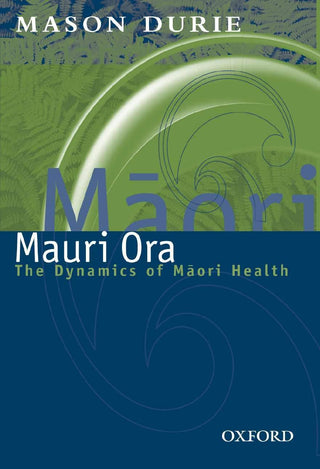Mauri Ora : The Dynamics of Maori Health
- Unit price
- / per
-
Author:DURIE Mason
-
ISBN:9780195584189
-
Publication Date:May 2001
-
Edition:1
-
Pages:314
-
Binding:Paperback
-
Publisher:Oxford University Press
-
Country of Publication:Australia


A Back Order button means that we don’t have the book in stock at our store. It may already be on order – or we can order it for you from a publisher or distributor at no additional cost.
As we source items from around the globe, a back-order can take anywhere from 5 days to several weeks to arrive, depending on the title.
To check how long this might take, you’re welcome to contact us and we can provide an ETA or any other information you need. We recommend checking the timeframe before committing to an online order.
Mauri Ora : The Dynamics of Maori Health
- Unit price
- / per
-
Author:DURIE Mason
-
ISBN:9780195584189
-
Publication Date:May 2001
-
Edition:1
-
Pages:314
-
Binding:Paperback
-
Publisher:Oxford University Press
-
Country of Publication:Australia
Description
Mauri Ora outlines the relevance of culture, identity, and socio-economic factors to health. Mason Durie draws on many years of experience to bring fresh perspectives on Maori health, especially mental health. Not only is there a comprehensive clinical review of suicide, depression, and alcohol and drug misuse, but there is also a thorough exploration of the origins of poor health and strategies for improving health.
As a sequel to Whaiora, Mauri Ora contains new insights into a Maori psychology and provides useful guidelines for practitioners, especially those who are involved in counselling Maori clients or establishing mental health services for Maori. In addition, population approaches to health, such as community and hapu development, are discussed within a framework that connects health to the broader aims of Maori development.
Few books are able to accurately interpret the health perspectives of indigenous peoples, the viewpoints of clinicians, or the resolve of community leaders. Mauri Ora successfully brings together these many strands, presenting health as 'the dynamic interaction of people with each other as well as with wider cultural, social, economic, political and physical environments'.
Also available:
Whaiora
Adding product to your cart
You may also like
A Back Order button means that we don’t have the book in stock at our store. It may already be on order – or we can order it for you from a publisher or distributor at no additional cost.
As we source items from around the globe, a back-order can take anywhere from 5 days to several weeks to arrive, depending on the title.
To check how long this might take, you’re welcome to contact us and we can provide an ETA or any other information you need. We recommend checking the timeframe before committing to an online order.
You may also like
You may also like
-
Mauri Ora outlines the relevance of culture, identity, and socio-economic factors to health. Mason Durie draws on many years of experience to bring fresh perspectives on Maori health, especially mental health. Not only is there a comprehensive clinical review of suicide, depression, and alcohol and drug misuse, but there is also a thorough exploration of the origins of poor health and strategies for improving health.
As a sequel to Whaiora, Mauri Ora contains new insights into a Maori psychology and provides useful guidelines for practitioners, especially those who are involved in counselling Maori clients or establishing mental health services for Maori. In addition, population approaches to health, such as community and hapu development, are discussed within a framework that connects health to the broader aims of Maori development.
Few books are able to accurately interpret the health perspectives of indigenous peoples, the viewpoints of clinicians, or the resolve of community leaders. Mauri Ora successfully brings together these many strands, presenting health as 'the dynamic interaction of people with each other as well as with wider cultural, social, economic, political and physical environments'.
Also available:
Whaiora -
-
Author: DURIE MasonISBN: 9780195584189Publication Date: May 2001Edition: 1Pages: 314Binding: PaperbackPublisher: Oxford University PressCountry of Publication: Australia
Mauri Ora outlines the relevance of culture, identity, and socio-economic factors to health. Mason Durie draws on many years of experience to bring fresh perspectives on Maori health, especially mental health. Not only is there a comprehensive clinical review of suicide, depression, and alcohol and drug misuse, but there is also a thorough exploration of the origins of poor health and strategies for improving health.
As a sequel to Whaiora, Mauri Ora contains new insights into a Maori psychology and provides useful guidelines for practitioners, especially those who are involved in counselling Maori clients or establishing mental health services for Maori. In addition, population approaches to health, such as community and hapu development, are discussed within a framework that connects health to the broader aims of Maori development.
Few books are able to accurately interpret the health perspectives of indigenous peoples, the viewpoints of clinicians, or the resolve of community leaders. Mauri Ora successfully brings together these many strands, presenting health as 'the dynamic interaction of people with each other as well as with wider cultural, social, economic, political and physical environments'.
Also available:
Whaiora-
Author: DURIE MasonISBN: 9780195584189Publication Date: May 2001Edition: 1Pages: 314Binding: PaperbackPublisher: Oxford University PressCountry of Publication: Australia
-



